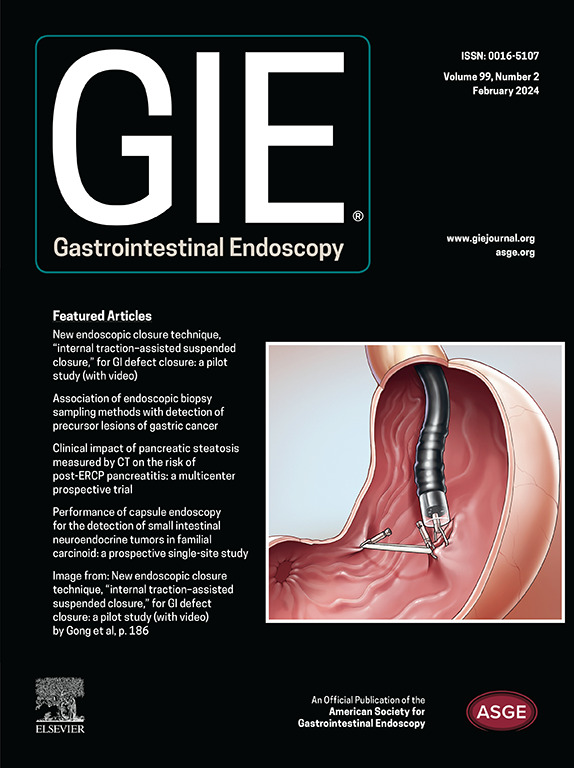Recellularization via electroporation therapy of the duodenum combined with glucagon-like peptide-1 receptor agonist to replace insulin therapy in patients with type 2 diabetes: 12-month results of a first-in-human study
IF 6.7
1区 医学
Q1 GASTROENTEROLOGY & HEPATOLOGY
引用次数: 0
Abstract
Background and Aims
Studies have shown that hydrothermal duodenal mucosal ablation results in improved glycemic control. Recellularization via electroporation therapy (ReCET) is a novel endoscopic procedure that uses electroporation to induce cellular apoptosis and subsequent reepithelization. In this study, we aimed to eliminate exogenous insulin treatment in type 2 diabetes (T2D) patients through a single ReCET procedure combined with a glucagon-like peptide-1 receptor agonist. Feasibility, safety, and (dose) efficacy of ReCET were assessed.
Methods
This first-in-human study included patients with T2D on basal insulin (age, 28-75 years; body mass index, 24-40 kg/m2; glycosylated hemoglobin, ≤64 mmol/mol; C-peptide, ≥0.2 nmol/L). The electroporation dose was optimized during the study, starting with single 600 V and ending with double 750 V treatments. All patients underwent ReCET, after which insulin was discontinued and semaglutide (glucagon-like peptide-1 receptor agonist) was initiated. The primary endpoints were feasibility (procedure time [from catheter in to catheter out], technical success rate), safety, and efficacy (patients off insulin at 6 months; HbA1c, ≤58 mmol/mol).
Results
Fourteen patients underwent endoscopic ReCET. The median procedure time was 58 (interquartile range, 49-73) minutes. ReCET demonstrated a technical success rate of 100%. No device-related severe adverse events or severe hypoglycemic events were observed. At the 12-month follow-up, 12 (86%) patients remained off exogenous insulin therapy, with significant improvements in glycemic control and metabolic parameters. The 2 patients in whom insulin therapy was reintroduced both received ReCET at the lowest voltage (single 600 V).
Conclusion
These results suggest that ReCET is feasible and safe. In combination with semaglutide, ReCET may be a promising therapeutic option to replace insulin therapy in selected T2D patients while improving glycemic control and metabolic health.
十二指肠电穿孔再细胞疗法与 GPL-1 受体激动剂相结合,取代 2 型糖尿病患者的胰岛素疗法;首次人体试验的 12 个月结果。
背景和目的:研究表明,水热十二指肠粘膜消融术可改善血糖控制。电穿孔再细胞化疗法(ReCET)是一种新型的内窥镜手术,它利用电穿孔诱导细胞凋亡,随后进行再上皮化。在这项研究中,我们的目标是通过一次 ReCET 治疗结合 GLP-1 受体激动剂(GLP-1RA),消除 T2D 患者的外源性胰岛素治疗。我们对 ReCET 的可行性、安全性和(剂量)疗效进行了评估:首次人体研究,包括使用基础胰岛素的 T2D 患者(28-75 岁;体重指数 24-40kg/m2,HbA1c ≤64mmol/mol;C 肽≥0.2nmol/L)。电穿孔剂量在研究过程中不断优化,从单次 600V 治疗开始,到双次 750V 治疗结束。所有患者都接受了 ReCET,之后停用胰岛素,开始使用塞马鲁肽(GLP-1RA)。主要终点是:可行性(手术时间[导管进出]、技术成功率)、安全性和疗效(患者在 6 个月内停用胰岛素;HbA1c ≤58mmol/mol):结果:14 名患者接受了内镜 ReCET。中位手术时间为 58 分钟(IQR 49-73 分钟)。ReCET 的技术成功率为 100%。未观察到与设备相关的 SAE 或严重低血糖事件。在 12 个月的随访中,12 名患者(86%)仍未使用外源性胰岛素治疗,血糖控制和代谢指标均有显著改善。重新使用胰岛素治疗的 2 名患者均接受了最低电压(单次 600V)的 ReCET:这些结果表明,ReCET 是可行且安全的。结论:这些结果表明,ReCET 是可行且安全的。ReCET 与塞马鲁肽联合使用,可能是一种很有前景的治疗方法,可替代选定 T2D 患者的胰岛素治疗,同时改善血糖控制和代谢健康。
本文章由计算机程序翻译,如有差异,请以英文原文为准。
求助全文
约1分钟内获得全文
求助全文
来源期刊

Gastrointestinal endoscopy
医学-胃肠肝病学
CiteScore
10.30
自引率
7.80%
发文量
1441
审稿时长
38 days
期刊介绍:
Gastrointestinal Endoscopy is a journal publishing original, peer-reviewed articles on endoscopic procedures for studying, diagnosing, and treating digestive diseases. It covers outcomes research, prospective studies, and controlled trials of new endoscopic instruments and treatment methods. The online features include full-text articles, video and audio clips, and MEDLINE links. The journal serves as an international forum for the latest developments in the specialty, offering challenging reports from authorities worldwide. It also publishes abstracts of significant articles from other clinical publications, accompanied by expert commentaries.
 求助内容:
求助内容: 应助结果提醒方式:
应助结果提醒方式:


